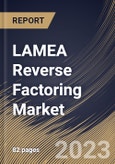Due to notable macro-level barriers like unstable capital availability and poor financial services, as well as remarkable micro-level barriers such as a lack of collateral and asymmetric knowledge, these problems are frequently encountered in developing nations. Reverse factoring minimizes default, suppliers' credit, or payment risks associated with financial institutions and boosts security to solve these problems, enabling SMEs to complete bigger orders and boosting the need for a variety of factoring services. Additionally, SCF streamlines the flow of working capital throughout the whole supply chain and improves relationships between buyers and suppliers, which spurs the expansion of the market.
Governments, associations, and major participants in the sector are being encouraged to increase the accessibility of SCF services globally as a result of the growing public knowledge of the advantages of reverse factoring services.
The shifting of firms' attention from various industries to bad debt evasion as well as business growth with improved financial stability, can be credited with the expansion of the reverse factoring demand in Latin America. Many Latin American nations, including Peru, Chile, Argentina, and Brazil, are seeing increased demand for reverse factoring services across all industries. Additionally, domestic and international reverse factoring services provide exporters with simple access to capital. A good market outlook for various financing options is being created by the region's expanding F&B business and staffing agencies. This, in turn, ensures the advancement of the market throughout the region.
The Brazil market dominated the LAMEA Reverse Factoring Market by Country in 2022 and would continue to be a dominant market till 2029; thereby, achieving a market value of $15 Billion by 2029. The Argentina market is experiencing a CAGR of 12.6% during (2023-2029). Additionally, The UAE market would showcase a CAGR of 11.7% during (2023-2029).
Based on Category, the market is segmented into Domestic and International. Based on Financial Institution, the market is segmented into Banks and Non-banking Financial Institutions. Based on End-use, the market is segmented into Manufacturing, Transport & Logistics, Information Technology, Healthcare, Construction and Others. Based on countries, the market is segmented into Brazil, Argentina, UAE, Saudi Arabia, South Africa, Nigeria, and Rest of LAMEA.
The market research report covers the analysis of key stake holders of the market. Key companies profiled in the report include HSBC Holdings plc, Barclays PLC, JPMorgan Chase & Co., Banco Bilbao Vizcaya Argentaria SA, Deutsche Factoring Bank GmbH & Co. KG (Deutsche Leasing), Drip Capital Inc., PrimeRevenue, Inc., Trade Finance Global, Tradewind GmbH, and Credit Suisse Group AG.
Scope of the Study
By Category
- Domestic
- International
By Financial Institution
- Banks
- Non-banking Financial Institutions
By End-use
- Manufacturing
- Transport & Logistics
- Information Technology
- Healthcare
- Construction
- Others
By Country
- Brazil
- Argentina
- UAE
- Saudi Arabia
- South Africa
- Nigeria
- Rest of LAMEA
Key Market Players
List of Companies Profiled in the Report:
- HSBC Holdings plc
- Barclays PLC
- JPMorgan Chase & Co.
- Banco Bilbao Vizcaya Argentaria SA
- Deutsche Factoring Bank GmbH & Co. KG (Deutsche Leasing)
- Drip Capital Inc.
- PrimeRevenue, Inc.
- Trade Finance Global
- Tradewind GmbH
- Credit Suisse Group AG
Unique Offerings
- Exhaustive coverage
- The highest number of Market tables and figures
- Subscription-based model available
- Guaranteed best price
- Assured post sales research support with 10% customization free
Table of Contents
Companies Mentioned
- HSBC Holdings plc
- Barclays PLC
- JPMorgan Chase & Co.
- Banco Bilbao Vizcaya Argentaria SA
- Deutsche Factoring Bank GmbH & Co. KG (Deutsche Leasing)
- Drip Capital Inc.
- PrimeRevenue, Inc.
- Trade Finance Global
- Tradewind GmbH
- Credit Suisse Group AG








